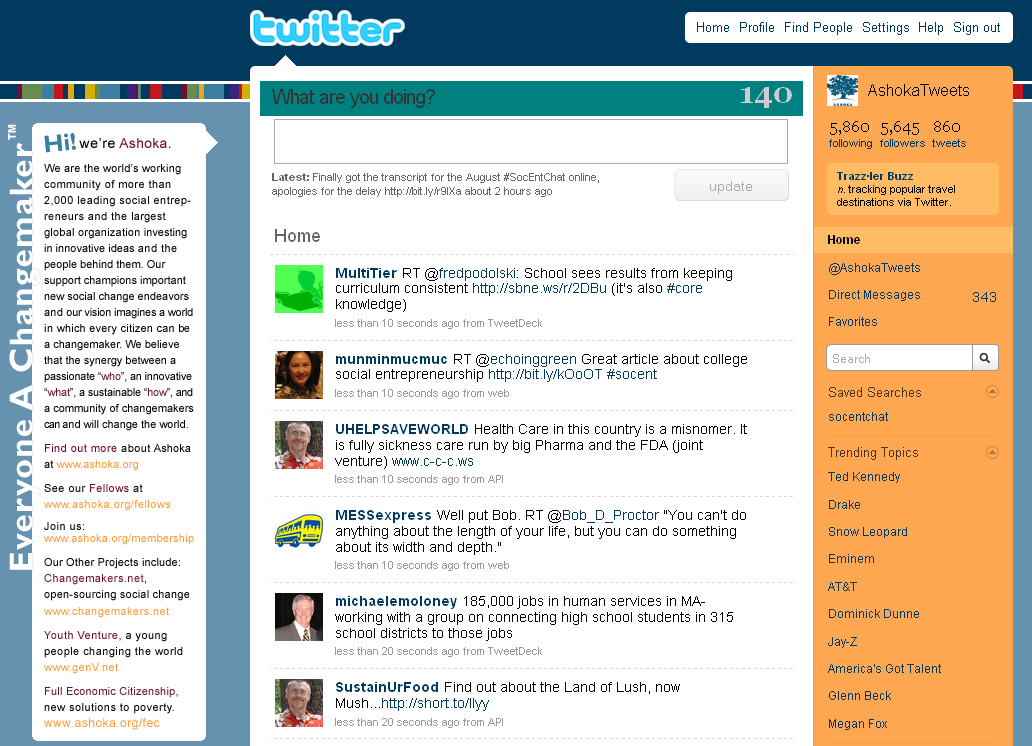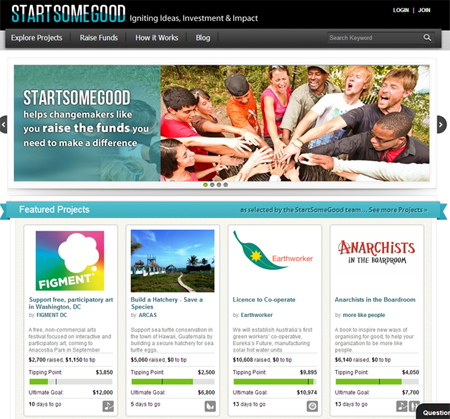This was written as a guest post for Beth Kanter's blog, exploring how Ashoka is fulfilling our mission on Twitter:

Ashoka: Innovators for the Public is relatively new to Twitter, having launched our main account, @AshokaTweets only in January. However in that time we’ve worked hard to build a community nearing 6,000 connections, sharing our news and stories in new ways and convening conversations that matter. This post will explain how we have approached Twitter and what we have learned.
But first, some back story:
Ashoka was founded on the belief that social entrepreneurs are the most powerful force changing the world. For almost 30 years Ashoka has been seeking out and supporting the best innovators working to create systemic change to join the Ashoka Fellowship. Supporting these visionary leaders, raising the profile of their work and facilitating collaborations and sharing has allowed many to pursue a life of changemaking, scaling their impact and, in many instances, affecting national policy in addition to thousands of members of their communities.
After 29 years of electing over 2,000 incredible social entrepreneurs as Fellows we have been able to observe some powerful themes in their work. And the most significant is this: great social entrepreneurs empower their communities, and invite and inspire those around them to become changemakers themselves.
With this insight we gained a deeper appreciation for the fact that innovation happens at many levels and we saw more clearly the kind of world we were working to create, a world many of our Fellows are leading towards, one in which every person has the opportunity to create positive change in their community, and where our collective intelligence and initiative will allow solutions to outrun the challenges we face. This led to our new tagline and mission, creating an Everyone a Changemaker™ world.
It was this mission that drew me to Ashoka, and which drew Ashoka to me. Building an Everyone a Changemaker™ world is a very different mission from simply looking for the world’s elite social entrepreneurs, it involves using the stories and examples of these entrepreneurs to inspire people to action, sharing lessons learned across our networks and opening up the innovation process to more people. This called for a new approach to outreach and communications and led to me joining Ashoka last year in a new position of Digital Marketing Strategist.
Our recently re-launched Changemakers.com website is to most high-profile example of Ashoka’s new approach to building community and fostering innovation, but so too is the work we are doing in social media and, in particularly Twitter.
The question we asked ourselves when we were planning to launch a Twitter account was: how could we use Twitter to help build an Everyone A Changemaker™ world? In thinking about this question we realized that one of Ashoka’s most important roles as the oldest and largest organization focused on Social Entrepreneurship was as convener, that we have the opportunity to bring together diverse insights and experiences to help map the most effective way forward in tackling many of the world’s most pressing challenges. We wanted to continue to play this role on Twitter.
In addition I felt it was important that we be as human as possible, highlighting not only our Fellows but our staff, and empowering them to be more effective advocates. This was also the chance to share news in a more timely fashion, as well as to proactively reach out and form connections, answer questions, and spark conversations.
Our goals, therefore, where to:
-be timely;
-be human;
-be proactive;
-convene.
Timely means sharing our news rapidly, as it came in, rather than simply crafting careful news stories for our website at a rate of no more than one a week. It means monitoring the online conversations about social entrepreneurship and issues we care about (we now use M|Buzz from Meltwater to help us do this) and directing attention to news hits and interesting blog posts. It means responding to questions rapidly and directing people to where they can find the information they are looking for.
The goal of being human has led me to run several Introduction to Twitter seminars and webinars for our staff. We currently have over 45 of my colleagues on Twitter where they are sharing their passion for our work and growing our reach and connections exponentially. The next step will be to integrate this onto our website where soon you will be able to see a list and live stream of all our staff on Twitter, along with one for our Fellows. Ashoka does such a diversity of work, from eHealth projects to new social change financing models, it’s impossible for a single person like me to accurately represent it. Now those with the knowledge and passion for these topics can participate themselves, in their own words, in the conversations of relevance to them, bringing new ideas back into the organization and better informing the wider sector on what we’re up to.
Being human also means acknowledging who the person behind an organizational Twitter handle is. The bio of AshokaTweets says “Tweets by @tomjd and friends”.
Being proactive certainly rules out using RSS feeds to populate our Twitter feed (with one exception, set up purely for that purpose and soon to be phased out). Each tweet is hand-crafted and relevant to our audience, something we checked by asking our followers want sort of information they wanted from us in a poll. We also participated in conversations with organizations such as Skoll Foundation, Social Actions and Change.org to agree on some shared hashtags to denote our areas of work, which led to widespread adoption of #socent for Social Entrepreneurship. We also use Twitter to proactively reach out and respond to comments about Ashoka, social entrepreneurship and social change
Finally, in considering how to use Twitter to convene conversations that matter we came up with the ideas of a monthly real-time discussion on Twitter, #SocEntChat, short for Social Entrepreneurship Chat. #SocEntChat takes place on the first Wednesday of every month from 4-6pm US EST (although the recent chat on Rural Innovation in Africa and India was moved to a more Africa and India-friendly time of 12-2 US EST) focused on a specific topic. Recent chats have looked at green entrepreneurship, mobile innovation and building cultures of social entrepreneurship on university campuses. We have had contributors from North America, Asia, Africa, Europe, South America and Australia, representing entrepreneurs, staff from large non-profits, activists, enthusiasts, bloggers and more. Conversations focus on next steps and areas for further exploration. All the transcripts can be accessed from our Squidoo Lense.
The next #SocEntChat is being held on Wednesday September 2 on the topic of Rethinking Mental Health. We would love you to join us.
We still have a lot to learn about Twitter and the microblogging medium will continue to evolve in interesting ways. What is clear is that a platform that allows people to connect with one another and talk about the things they care about is a platform made for social change, a place where we can build constituencies and communities capable of collaboratively creating a better future. In other words, a place for changemakers.

 Bill Drayton, founder of
Bill Drayton, founder of 
